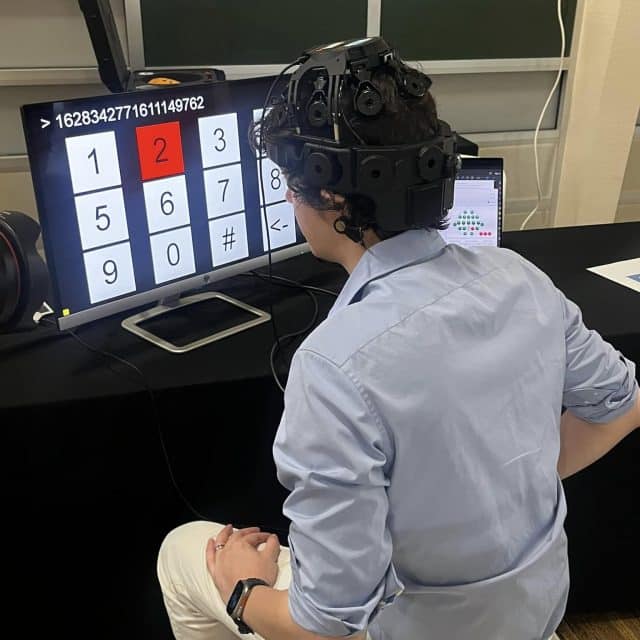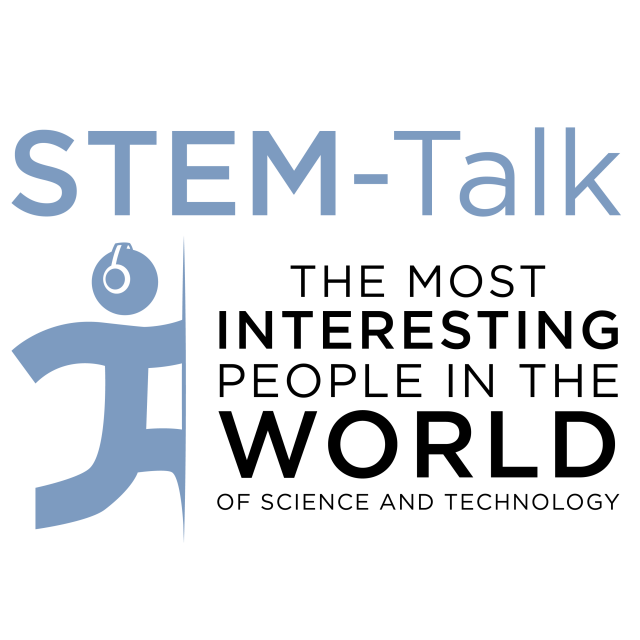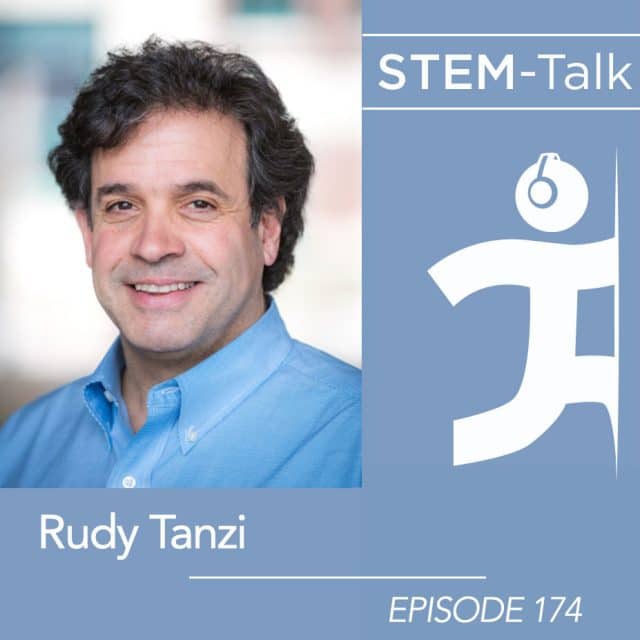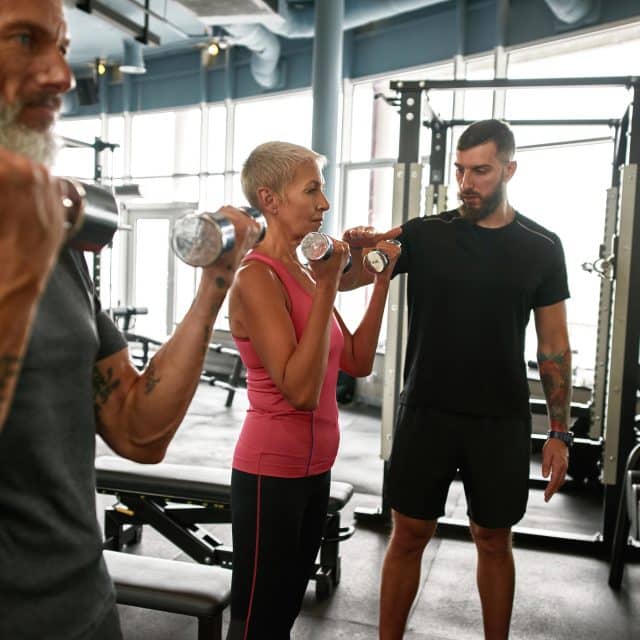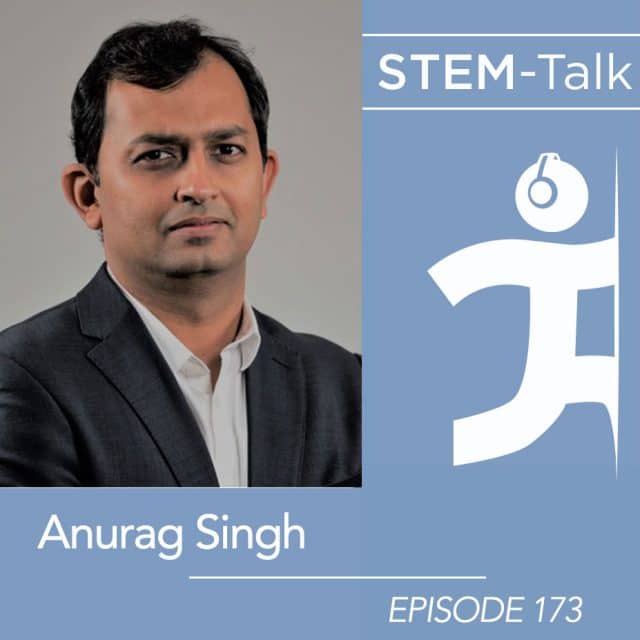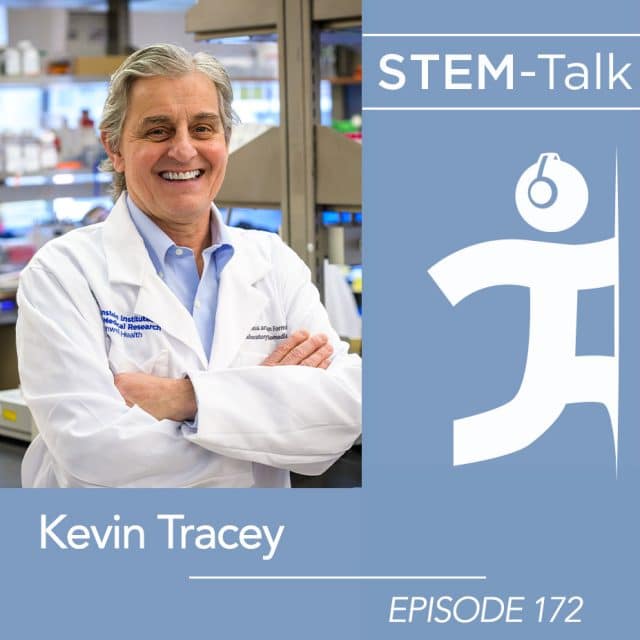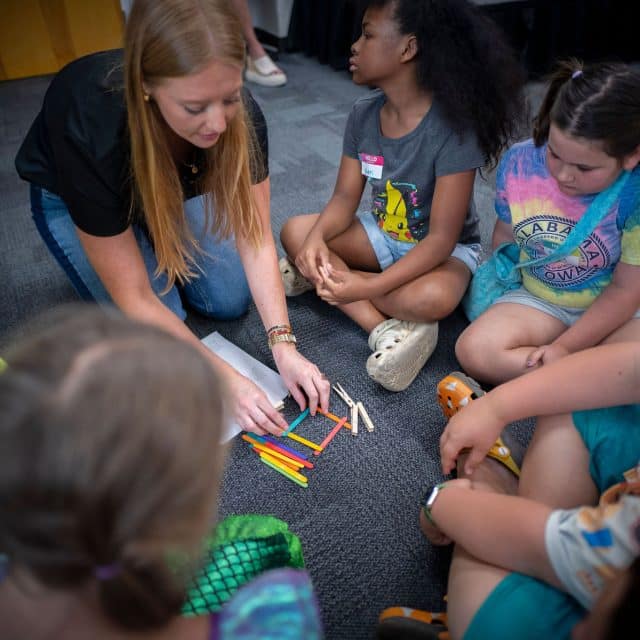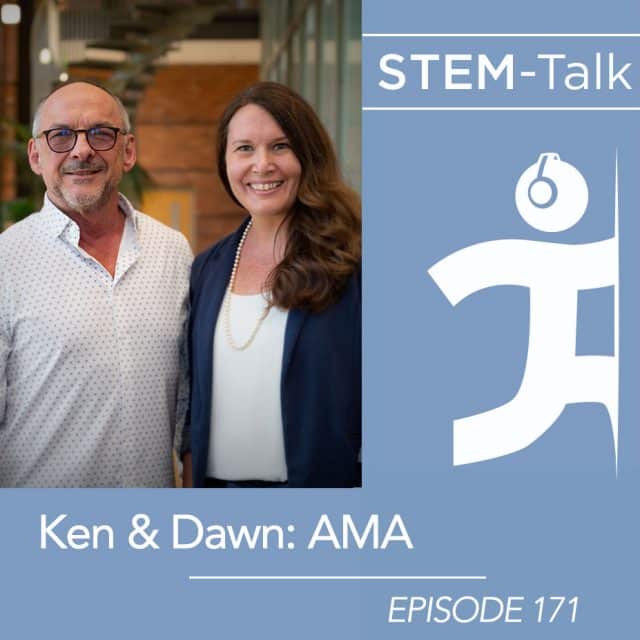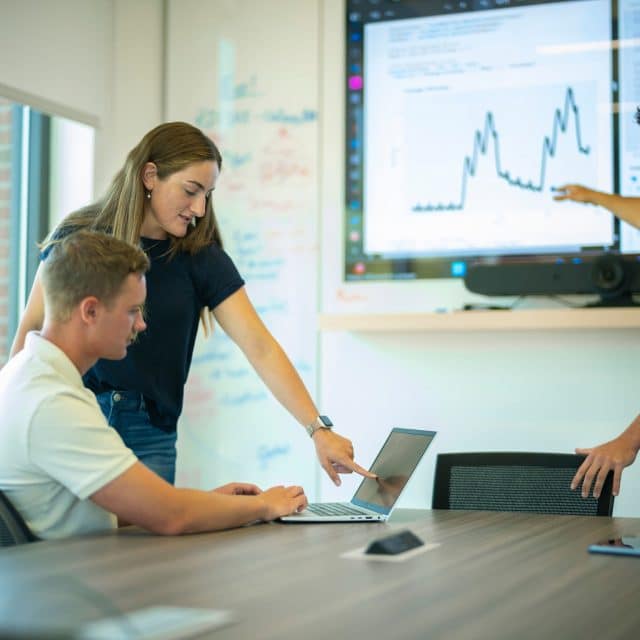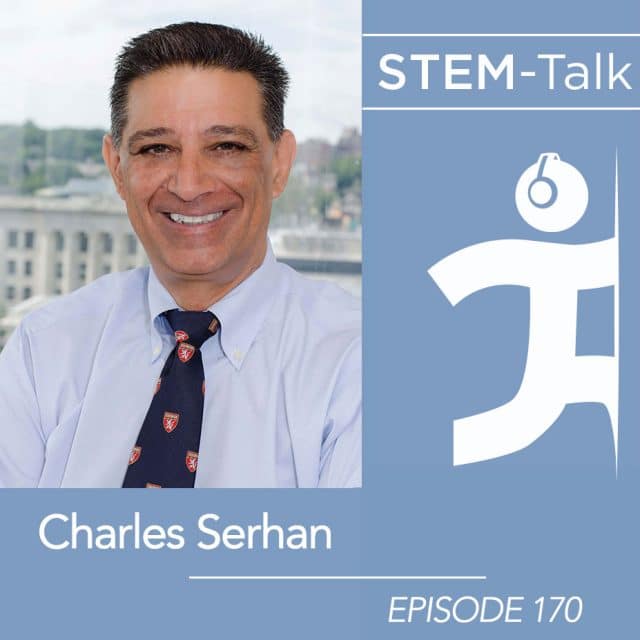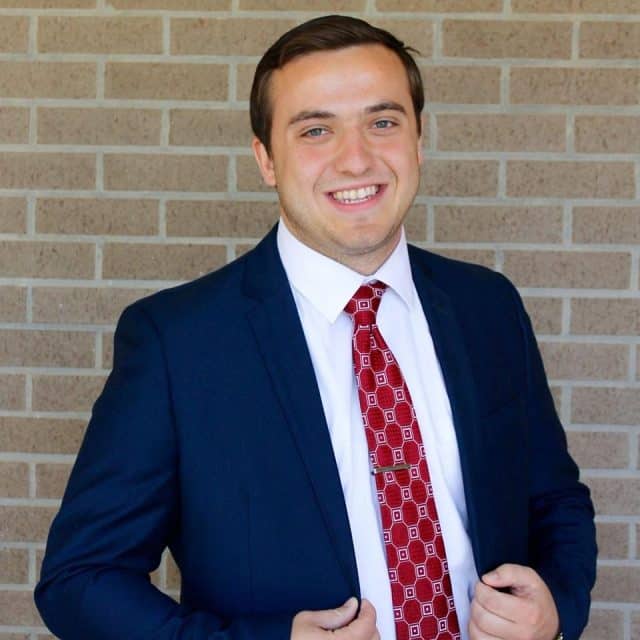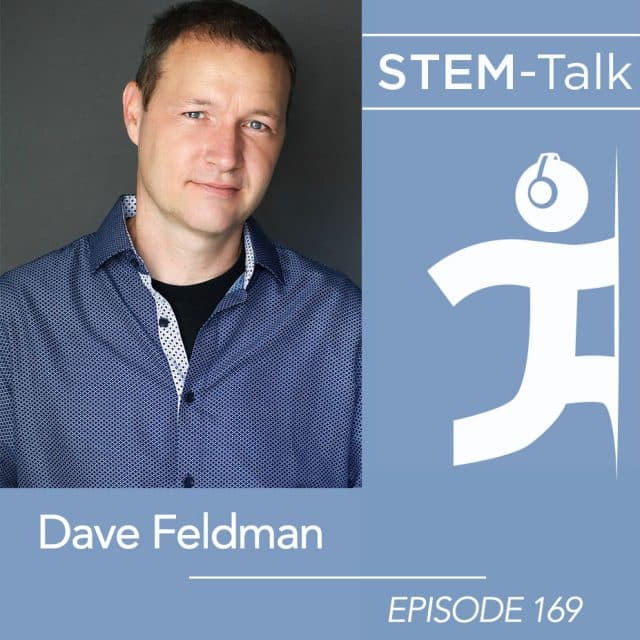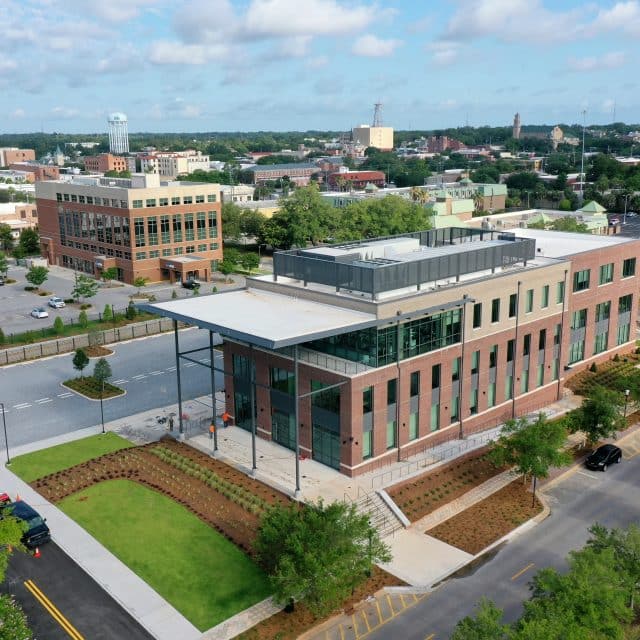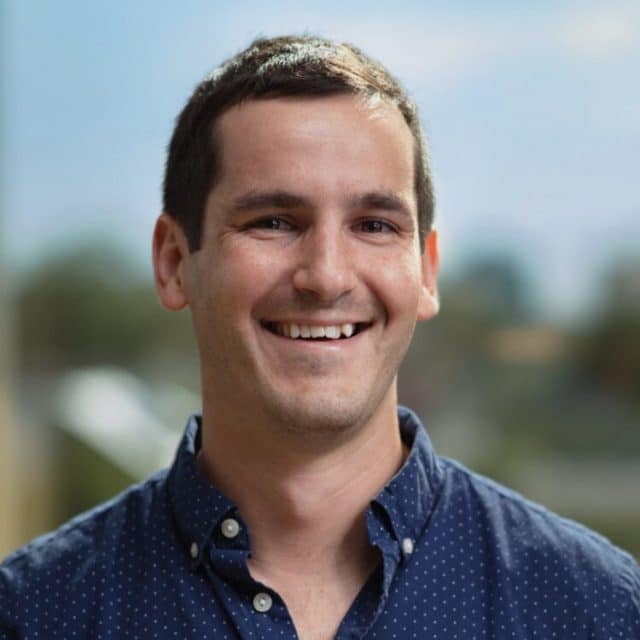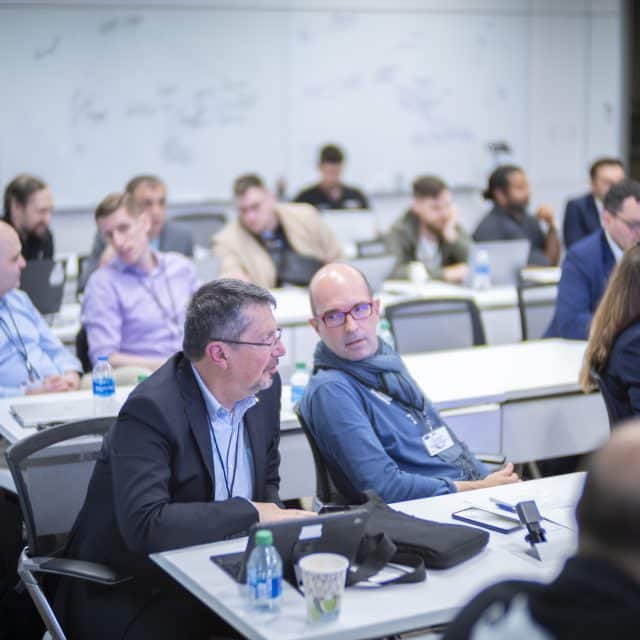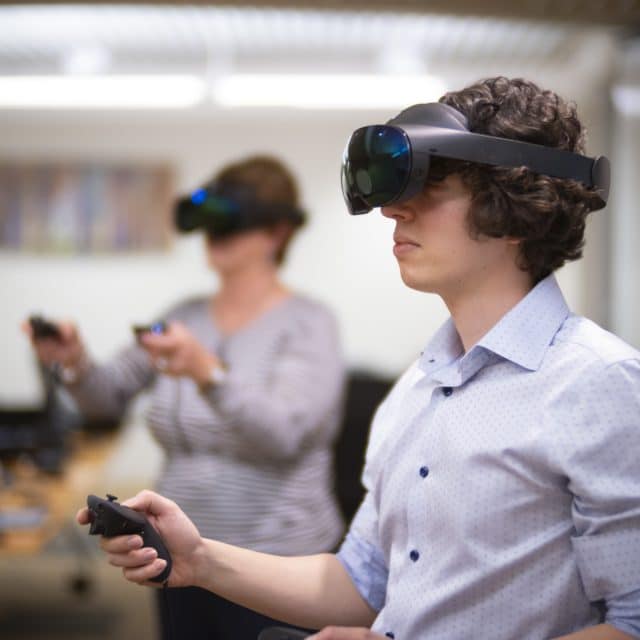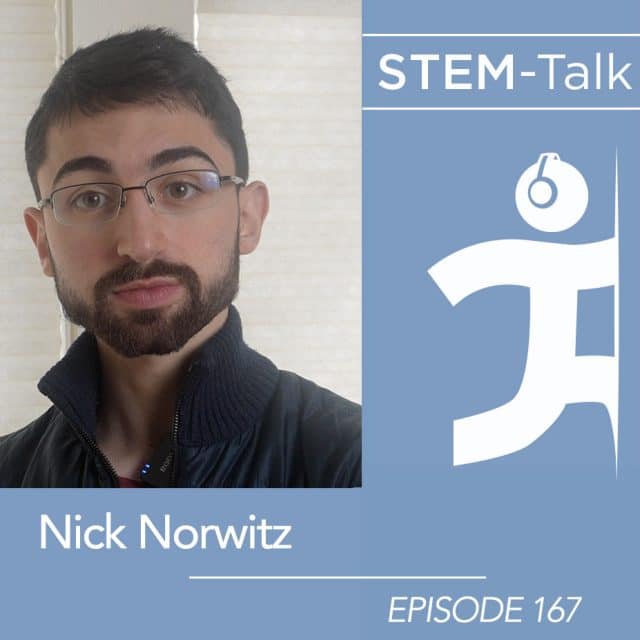Ocala Research Showcase highlights IHMC’s footprint and impact
Published 11.15.24 The Ocala community has long supported IHMC. But to many, the research that goes on there is a bit of a mystery. Ocala’s campus is home to computer scientists, engineers, and linguists engaged in research spanning machine learning, natural language understanding, natural language understanding for social cybersecurity, and speech analysis for physiological state determination. The inaugural Ocala Research Showcase was an open house-style event highlighting IHMC scientists and sharing the impact their research can have in artificial intelligence and machine learning, robotics and exoskeletons, and healthspan, resilience, and performance. Research Scientist Dr. Ian Perera led the coordination of… Read More
STEM-Talk wins Signal Award in Health & Wellness Podcasts
Published 10.30.24 IHMC’s podcast STEM-Talk has earned another accolade, winning the bronze award in the third Annual Signal Awards for best General Health and Wellness podcast. Dr. Ken Ford, IHMC’s co-founder and CEO, co-hosts the podcast with colleagues from IHMC, including Drs. Dawn Kernagis, Marcas Bamman, and Tommy Wood. The episode featured by the Signal Award is Episode 162 with Dr. Marc Hamilton, an international expert in muscle physiology and professor at the University of Houston. He has published pioneering work on the soleus push-up, a potent physiological method which Marc discovered having the ability to elevate metabolism for hours,… Read More
STEM-Talk: Rudy Tanzi on genetics, aging, and the hallmarks of Alzheimer’s
Published 10.28.24 Dr. Rudy Tanzi is best known for co-discovering all three familial early onset Alzheimer’s genes — discoveries that have expanded what we know about the disease, how we might counter its effects, and the speed with which drug therapies can be brought to market. He has co-written two books with Deepak Chopra, , “Super Brain” and “The Healing Self,” and is one of the top 50 most cited neuroscientists in the world. He also plays keyboards in the studio for Aerosmith and its guitar player Joe Perry. A well-rounded career to be certain. Tanzi is the director of… Read More
National Institutes of Health award for $7.7 million to determine how people over 60 attain the health benefits of exercise
Published 10.01.24 Dr. Marcas Bamman has received a $7.7 million award from the National Institutes of Health (NIH) for a clinical trial to determine how people age 60 and older attain the health benefits of exercise. Bamman is a Senior Research Scientist at the Florida Institute for Human and Machine Cognition (IHMC) who leads the Institute’s Healthspan, Resilience, and Performance team. This new project is called “Multidimensional Predictive Modeling to Understand Mechanisms of Exercise Response Heterogeneity in Older Adults.” It is a collaboration with the Oklahoma Medical Research Foundation and the University of Florida. “This type of research is what the new… Read More
STEM-Talk: Anurag Singh on aging, exercise, and urolithin-A
Published 9.23.24 Dr. Anurag Singh has spent his career using research to unlock a better treatment path for the chronic diseases that dominated his early medical practice. “I felt I was blindly treating the symptomology of these chronic diseases (cancer, diabetes), and it gave rise to the question, ‘What if we could intervene earlier?’” Singh says. The journey to answer that question led him to Nestle Health Science and ultimately to his role as chief medical officer at Timeline Nutrition, a Swiss life-science company focused on improving mitochondrial and cellular health. Singh, who has a medical degree in internal medicine… Read More
STEM-Talk: Kevin Tracey on bioelectrical medicine and inflammation’s toll
Published: 9.5.24 Few people know as much about inflammation and neuroscience as Dr. Kevin Tracey does. So how does he explain what inflammation — whose identification can be traced to the time of Galen — means to human health? “Every year, 60 million people die on Earth,” he says. “Two-thirds of them — 40 million people — die of a disease caused or made worse by inflammation.” That’s why he sees inflammation as “the single major threat to long healthspan because it contributes to the major killers and major unsolved diseases on the planet.” In the latest episode of STEM-Talk, available now… Read More
Evening Lectures focus on human performance, work culture and much more
Published: 9.3.24 The Evening Lecture series for Fall 2024 at Florida Institute for Human and Machine Cognition (IHMC) features a heavy focus on human performance, workplace culture and related topics. The sessions begin in Pensacola on Sept. 19, 2024, with Sarah Robb O’Hagan, the chief executive officer of EXOS, a coaching company focused on human performance utilizing a team of fitness specialists, performance coaches, physical therapists, dietitians, and psychologists to maximize team performance. She led the reinvention and turnaround of Gatorade as its global president, the digital transformation of Equinox Fitness Clubs as its President and the transformation of Flywheel… Read More
Science Saturdays schedule for Fall 2024 released
Published 8.22.24 Science Saturdays are back and ready to turn on new scientific minds this school year. These 90-minute educational enrichment sessions are a cornerstone piece of community outreach at Florida Institute for Human and Machine Cognition (IHMC). Topics in 2024 will include 3D printing, bottle rockets, secret codes, and more. The sessions are free to the families who attend, thanks to the support of community partners. For more than 17 years now, Science Saturday has inspired students in grades 3-7 in both Pensacola and on the Institute’s Ocala campus. In the 2023-2024 school year, more than 300 students attended… Read More
STEM-Talk: Ken takes listeners questions for an Ask Me Anything episode
Published 8.9.24 Is AI at its peak or is it just getting warmed up? That’s just one of the questions Dr. Ken Ford, IHMC’s CEO and Founder weighs in on in this “Ask Me Anything” episode of STEM-Talk available now wherever you listen to podcasts. In this episode, Ken, who is Fellow of the Association for the Advancement of Artificial Intelligence, shares his thoughts on AI given the recent developments in the field, particular in the realm of Generative AI, with programs like Chat GPT becoming a household name in the last year. “(Large Language Models) as they have been… Read More
Air Force Academy’s Cadet Summer Research Program interns find home at IHMC
Published 7.26.24 Students have long had a home at the Florida Institute for Human and Machine Cognition. This summer’s student collaborators included cadets from the U.S. Air Force Academy participating in the Cadet Summer Research Program. This program offers opportunities for cadets to get out of the classroom and experience real-world research and development that align with their majors, interests, and potentially their career fields. Senior Research Scientist Dr. Kevin Gluck, who worked with the students, says that although they won’t all pursue science or engineering in the Air Force, it is certain research and development will play a role… Read More
STEM-Talk: Charles Serhan, expert on specialized pro-resolving mediators, talks inflammation
Published 7.22.24 For Dr. Charles Serhan, music was one of the keys that unlocked his love of science. Serhan counts among his many talents, being an accomplished vibraphone player. “Many things I learned in music translated to science,” Serhan said. “If you really wanted to play well, you had to study and practice. It’s like learning a language. In science the same is true. You need to learn the language and study and practice every day.” Why does he love science? “The rigor and objectivity and the ability to test hypothesis an experiment,” he says. “Nothing is more fun than… Read More
IHMC partners with California-based research institute to take aim at the psychology of cyberattackers
Published 7.2.24 The battle against cyberattackers has often felt like an uphill slog. The Florida Institute for Human and Machine Cognition (IHMC) is part of a team looking to turn that tide. This spring, IHMC partnered with California-based nonprofit research institute SRI to take aim at the psychology of cyberattackers to better defend against their efforts. The project is funded by Intelligence Advanced Research Projects Activity (IARPA) — the research and development arm of the Office of the Director of National Intelligence — which launched it in February 2024. DNI refers to the project as Reimagining Security with Cyberpsychology-Informed Network… Read More
STEM-Talk: Dave Feldman on the Citizen Science Foundation, ketogenic diet research
Published 6.21.24 How did the son of two Bohemian graphic designers become a citizen science advocate who built his knowledge to turn his own health around? It’s a journey worth listening to, and in this episode of STEM-Talk, Dave Feldman shares that story. The episode is available now wherever you listen to podcasts. Feldman is the founder of the Citizen Science Foundation and is known for his research into the ketogenic diet. Dave is a software engineer by training who embraced a ketogenic diet to avoid his progression toward type 2 diabetes. After undertaking the high-fat/low-carbohydrate diet, Dave’ LDL cholesterol… Read More
New biomedical research complex opens IHMC’s next chapter
Published 6.11.24 The new $40 million biomedical research complex constructed by the Florida Institute for Human and Machine Cognition (IHMC) will be more than a striking addition to the Pensacola skyline. It will be an accelerant for the pace of discovery that will drive innovations in maximizing the healthspan for everyone from elite military operators and veterans to those with neurodegenerative diseases, musculoskeletal problems, and chronic metabolic conditions. The Healthspan, Resilience and Performance Research Complex is another step in the evolution of the vision that has been the bedrock of IHMC since its founding by Dr. Ken Ford, the Institute’s… Read More
Triumph Gulf Coast funding will help bolster research capabilities at Pensacola campus
Published 5.30.24 An investment of $7.8 million from Triumph Gulf Coast will allow IHMC to bolster its research capabilities with a facility designed to handle sensitive federal research in support of Department of Defense and intelligence community customers. The grant to the Florida Institute for Human and Machine Cognition was approved by Triumph’s board of directors in December 2023. Previous Triumph funding helped seed the $40 million Healthspan, Resilience, and Performance (HRP) research complex now under construction. The story is featured in the latest edition of IHMC’s newsletter, which is available now. The award includes funding to construct a highly… Read More
IHMC Robert Griffin represents the America on IEEE Technical Committee
Published 5.23.24 Dr. Robert Griffin has been named co-chairman of the IEEE Robotics and Automation Society Technical Committee on Humanoid Robots, representing the Americas. The Institute of Electrical and Electronics Engineers (IEEE) is the premier professional organization in the field. Griffin’s selection to co-chair the technical committee reflects the high regard for his work and for IHMC’s leadership in the field of humanoid robotics. “IHMC has been a pioneer in the field of humanoid robotics. Robert’s selection to the IEEE RAS Technical Committee is a much-deserved accolade for him and for the team at IHMC,” said Dr. Ken Ford, IHMC’s… Read More
STEM-Talk: Alessio Fasano on the roots of, treatments for celiac disease
Published 5.22.24 Dr. Alessio Fasano, who is considered the world’s leading expert in celiac disease and gluten-related disorders, returns for his second appearance on STEM-Talk. The interview is available now where you listen to podcasts. As he tells co-hosts Dr. Ken Ford and Dr. Marcas Bamman, he went to medical school with the idea of changing the world. And pediatrics, for him, was a love-at-first-sight way to accomplish this lofty goal. “I realized from the very beginning in medical school that dealing with kids was going to be more fun and interesting,” Fasano says. When it came time to choose… Read More
IHMC hosts the IGNITE event for the NATO Innovation Continuum
Published 5.21.24 Recently, IHMC hosted an international group of experts tasked with innovation and experimentation in the capabilities for members of the North Atlantic Treaty Organization (NATO). In February 2024, NATO’s Allied Command Transformation launched the Innovation Continuum 2024 series with an event in La Spezia, Italy. From that first event, named Spark, came an initial list of operational scenarios and possible technical solutions to be explored further. The Ignite event was the second event in the series. Senior Research Scientist and Associate Director Dr. Niranjan Suri was the host of the Ignite event. Throughout his career, Suri’s research has… Read More
IHMC researcher using cognitive science, novel language understanding methods to harness AI’s power
Published 5.16.24 Dr. Ian Perera started his research career by exploring the question of whether computers could become more intelligent and helpful assistants by learning the way children do. If the IHMC Research Scientist can make it work, the implications could be wide-ranging and substantial. Since joining IHMC in 2013, Perera has worked on numerous military and government projects using novel language understanding methods and cognitive science on problems from de-escalating heated social media conversations to improving trust between human and AI team members and more. His work is featured in the latest edition of the IHMC newsletter, available now…. Read More
STEM-Talk: Nick Norwitz on a keotogenic diet as metabolic medicine
Published 5.2.24 It may have been a given that Nick Norwitz would become a doctor – he is the child of physicians. “It was in some ways the default path,” Norwitz says. “Everything I’ve done in science and medicine has just been an absolute pleasure.” In the latest episode of STEM-Talk, available now where you listen to podcasts, Norwitz shares how what may have seemed to be an inevitable journey has evolved — and how it led him into research aimed at unlocking the potential of a ketogenic diet to improve metabolic health, mental health, and more. It is a search… Read More


